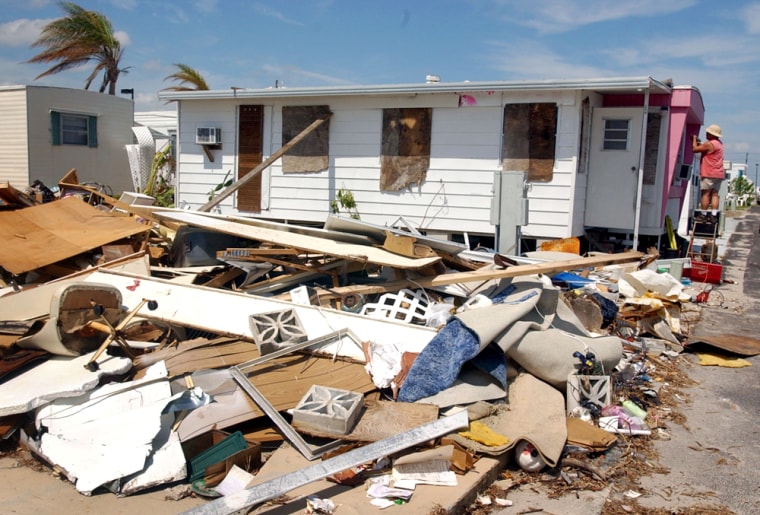Richard Hessel would like to find a three-bedroom house for himself, his friend and her two children. He can’t go back to his house — a cedar tree smashed into it during Hurricane Ivan. And her place next door is damaged, too.
But a week after the storm, the group was still in a shelter.
“We found a place today, but we were 30 minutes too late. It’s real frustrating,” Hessel said.
With thousands displaced by the storm, long-term housing — or even a hotel room — is hard to find. And the housing crunch could get even more serious with 3 million people told to evacuate ahead of Hurricane Jeanne.
The storm was on track to become the fourth hurricane to slam the state this season, a scenario unmatched in more than a century.
Officials don’t yet know how many people will need a new place to live. A shelter at Washington High School in Pensacola, the last open shelter in the county, still had 350 people living there going into this weekend, down from 1,000 after Ivan.
“We don’t have much of a choice,” said Hessel, who is staying at the shelter with his friend, April Lollar, and her children. “Look at the devastation you’ve had.”
Relief workers, power crews and insurance adjusters from out of town are taking up most of the motel rooms, so finding a place for the short-term is difficult.
Others whose homes were damaged or destroyed are staying with relatives or filling up some of those motel rooms. All will eventually need a place more permanent.
The Federal Emergency Management Agency is starting to try to identify apartments with vacancies and homes that may be available, said agency spokeswoman Mary Hudak. For people who can’t be moved into more permanent homes, FEMA provides trailers free for up to 18 months.
“We will bring as many (trailers) as we need,” Hudak said. “We have trailers available to begin moving just as quickly as we have places available to put them.”
Hudak added that FEMA is still focused on the more immediate needs of dealing with power outages and clearing debris. “It’s important for us first to try and get those roads clear, people back even to see their homes,” she said.
Finding long-term housing is made even more difficult because many of those still in shelters or in other temporary housing are also out of work, said Kim Moniz, a social worker with Escambia County Healthy Families.
That’s the situation for Joshua Torres, who talked to FEMA on Friday about getting help finding a temporary place to stay. He can’t pay — the Burger King where he works hasn’t reopened yet.
Torres, 18, his girlfriend, 19-year-old Misty Dunn and their 3-month-old son Isaiah can’t go back to the trailer where they lived because of water damage.
“The floor’s going to fall through any day,” Torres said.
Motels also are having a hard time reopening because of storm damage. Of the 8,500 hotel rooms and condos usually available for rent in the Pensacola area, virtually all that aren’t damaged are filled.
“It’s very difficult right now to get a hotel room, it’s next to impossible. We have so many emergency workers in town and so many displaced people whose homes are damaged,” said Megan MacPherson, a spokeswoman for the Pensacola Bay Area Convention and Visitors Bureau.
The Homewood Suites by Hilton was telling callers it has no rooms available through the end of this year, largely because of people displaced by the storm.
“There is a possibility there will be a significant shortage of available housing” for weeks, said Millard Adams, a Red Cross manager in Santa Rosa County, where 160 people were still in shelters a week after the storm.
Hessel will keep looking for a more permanent place so he and Lollar and her two kids can move out of the shelter and sleep on something other than small cots.
“I’ve called everywhere,” he said. “It’s real frustrating, but we’re not the only ones in the same boat.”
